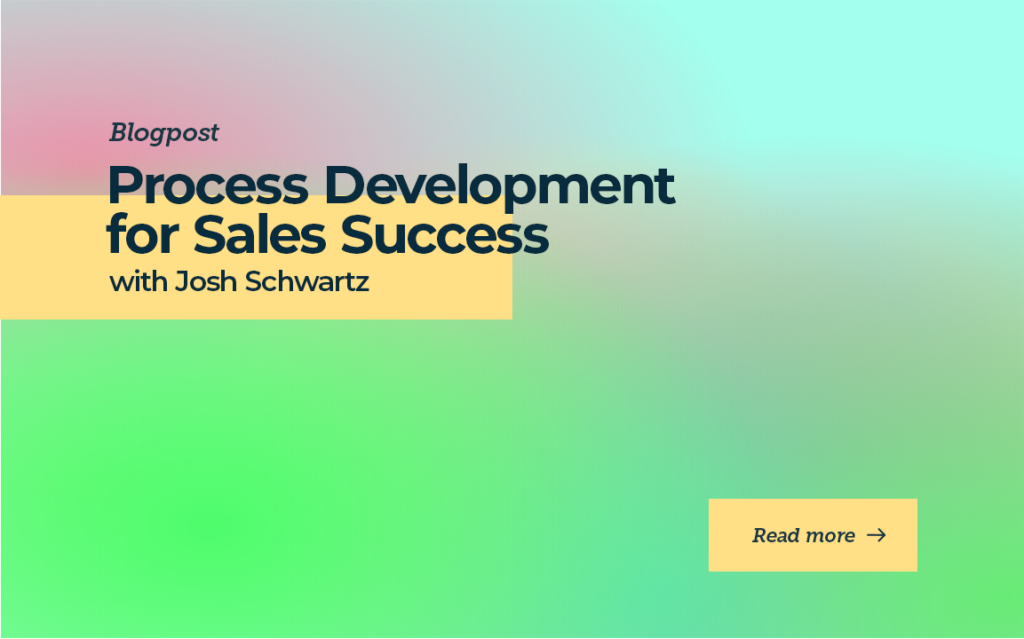Process Development for Sales Success with Josh Schwartz

Understanding sales compensation’s journey and sales strategies’ evolution is pivotal to startup growth and sales acceleration.
Our latest episode on the Predictable Revenue Podcast, hosted by Collin Stewart, dives deep with Josh Schwartz, Head of Sales Acceleration at Bregal Sagemount, into the intricacies of startup sales, from the foundational steps to the nuanced strategies that drive success.
Join us as we explore Josh’s firsthand experiences and insights, revealing valuable lessons for founders and sales professionals.
The Genesis of a Sales Strategy
Josh Schwartz’s entry into the startup world, particularly with a company initially named Gainsight, marks a compelling narrative of transition from the mortgage industry to the burgeoning field of software. This move was not just a career shift for Josh but a deep dive into the uncharted waters of predictive analytics and salesforce integration. This venture would demand adaptability and a keen sense of innovation.
At the heart of Josh’s early challenges was the fundamental question of targeting. The task seemed straightforward: book meetings. Yet, the simplicity belied the complexity of the endeavor.
From a background where sales encompassed a broad range of responsibilities, Josh initially underestimated the task. The startup landscape of sales technology was on the cusp of transformation, and navigating this terrain required more than traditional sales acumen. It needed a blend of creativity, strategic thinking, and a willingness to learn on the fly.
Building from the Ground Up
Josh was handed a book, “Predictable Revenue” by Aaron Ross, and a seemingly simple directive: figure it out. This moment underscores a pivotal point in many startups’ journeys: the transition from theoretical knowledge to practical application. Josh’s approach to targeting was methodical yet innovative.
He leveraged every resource available, from Salesforce case studies to LinkedIn profiles, to build a comprehensive list of potential leads. This process wasn’t just about list building but laying the groundwork for a scalable, targeted sales strategy.
The evolution of Josh’s strategy illustrates the iterative nature of startup sales processes. From attending conferences with a misguided focus to refining target demographics based on software integration, each step was a lesson in precision and adaptation.
The realization that salesforce admins were not the ideal demographic, though easy to book meetings with, shifted the focus towards more strategic, albeit challenging, targets like VP Sales and CROs.
Josh’s compensation based on meetings booked led to a pragmatic mix of targeting salesforce admins and higher-level executives. This blend of quantity and quality in lead generation exemplifies the balancing act many sales professionals navigate in the early stages of their careers.
The Catalyst for Efficiency
The introduction of Tout (acquired by Marketo), a tool for email sequencing, marked a significant turning point in Josh’s strategy. This tool allowed for the automation of personalized outreach at scale, transforming the efficiency of his processes.
The ability to send timed sequences to targeted lists revolutionized booking meetings, embodying the essence of “predictable revenue.” This strategy’s success lies not just in the technology itself but in the creative application of tools to meet the startup’s unique needs.
The Evolution of Targeting in Sales
The landscape of sales targeting has dramatically shifted from 2014 to the present, underscored by the leap in data accessibility and the sophistication of sales strategies. Josh illustrates this transformation through a recent anecdote involving a company’s struggle with identifying its ideal customer profile (ICP) and total addressable market (TAM).
This narrative unveils a common oversight in early-stage startups: the underutilization of technographics. Josh emphasizes the critical importance of aligning sales efforts with key integrations, such as Shopify for e-commerce platforms, to refine targeting and enhance the adoption curve of a product or service.
Technographics: The North Star for Targeting
Josh suggests starting with a clear understanding of potential customers’ existing technology stack.
This approach not only sharpens the focus of sales efforts but also ensures a higher success rate in customer acquisition by aligning product offerings with the technological needs and adoption stages of target companies. This insight underscores a strategic pivot from broad demographic criteria to a more nuanced, technology-based targeting method, offering a roadmap for startups to optimize their sales processes.

The Journey from Generalist to Specialist
The crucial phase of founder-led sales marks the initial steps of a company’s sales efforts. This period is characterized by the founder’s intrinsic knowledge of the product and market, which, while invaluable, needs to be effectively communicated and translated into a scalable sales strategy.
As the company grows, the necessity to transition from a founder-centric sales model to a more structured, team-oriented approach becomes apparent. This transition is vital for scaling sales operations and reducing the dependency on the founder for revenue generation, thereby increasing the company’s valuation and appeal to potential investors.
The First Sales Hire Dilemma
When contemplating the first sales hire, the conversation shifts to the strategic considerations founders must navigate. The decision between hiring an Account Executive (AE) or a Sales Development Representative (SDR) hinges on the founder’s sales expertise and the immediate needs of the business.
Josh advocates hiring an SDR or marketing personnel to generate qualified leads, allowing the founder to focus on high-value sales activities. This strategy not only streamlines the sales process but also sets the stage for nurturing talent within the company, with the potential for career advancement from SDR to more senior roles.
Nurturing Sales Talent
Investing in coaching and developing the first sales hires is a critical factor for long-term success.
Early-stage startups require individuals who possess the skill set for sales and embody a startup mentality characterized by versatility, passion, and a willingness to embrace varied responsibilities. This mindset ensures the sales team can adapt to a startup’s dynamic, often resource-constrained environment, contributing to its growth and scalability.
The Legacy of IBM’s Sales Training
Collin and Josh highlight the importance of structured methodologies in sales processes. IBM, known for pioneering sales training techniques, emphasized a disciplined approach that has influenced countless sales professionals.
As mentioned, the “Selling V” concept revolves around the idea that salespeople must earn the right to pitch their product by first achieving a mutual understanding with their prospects. This approach underscores a fundamental shift from transactional selling to a more consultative and value-driven interaction.
The Evolution of Sales Qualification Frameworks
The discussion explores how sales qualification frameworks like BANT (Budget, Authority, Need, Time-frame) have adapted.
While such models have been foundational in structuring sales conversations, there’s an emerging consensus on the need for more nuanced approaches that reflect the complex nature of modern B2B sales.
Schwartz and Stewart discuss the limitations of traditional qualification criteria in today’s sales environment, where understanding a prospect’s needs and educating them on solutions often takes precedence over immediate qualification based on budget or authority.
The Critical Role of Understanding
A key takeaway is the critical role of deep understanding in the sales process. Before selling begins, a salesperson must fully grasp the prospect’s situation, challenges, and needs.
This depth of understanding forms the basis for meaningful conversations leading to genuine solutions, moving from a one-size-fits-all sales pitch to a tailored dialogue that resonates with the prospect’s specific context.
Nurturing Prospects Over Longer Sales Cycles
The conversation acknowledges the reality of longer sales cycles in contemporary sales landscapes. Collin and Josh reflect on the necessity for sales strategies that account for the time and effort required to nurture prospects through these extended cycles.
The focus shifts from pushing for immediate sales to building relationships, educating prospects, and gradually guiding them toward a decision, emphasizing the strategic patience required in modern sales engagements.
Success Amid Sales Execution Challenges
In environments where product-market fit is exceptionally strong, companies often experience significant success, which can overshadow the nuances of sales execution.
This scenario presents a double-edged sword; while the product’s market alignment accelerates initial growth, underlying inefficiencies in sales processes can remain hidden. Such conditions suggest recognizing and addressing these inefficiencies can lead to a more sustainable growth trajectory.
Therefore, companies should not solely rely on their product-market fit but strive to refine their sales execution strategies continually to ensure long-term success.
From SDR to Sales Mastery
Josh Schwartz’s journey from an SDR to mastering sales calls exemplifies the value of personal initiative in developing sales expertise. Initially faced with the challenge of converting high-volume meetings into quality sales opportunities, Schwartz took it upon himself to create a structured approach to discovery calls.
This process involved scripting and a deep dive into understanding customer pain points through carefully crafted questions. The evolution from using a basic script to developing a nuanced, question-based approach to sales discovery illustrates the transformative power of self-driven learning and adaptability in sales roles.
Crafting Effective Sales Discovery Questions
The transition from basic questioning to a more sophisticated discovery process underscores the importance of understanding customer needs at a granular level. Initially, Schwartz’s approach to discovery was rudimentary and focused on basic qualification.
However, through experience, he identified the pivotal role of targeted questions in unlocking detailed insights into customers’ challenges, enabling a more effective positioning of the sales proposition. This evolution highlights the need for sales professionals to continually refine their questioning techniques to uncover surface-level needs and deeper organizational challenges that the product or service can address.
Building Rapport Through Research and Active Listening
The discussion emphasizes the significance of preparatory research and active listening in establishing rapport with potential clients.
Demonstrating a deep understanding of the prospect’s business and challenges from the outset of the conversation builds trust and differentiates the salesperson in a crowded marketplace.
This approach involves a shift from transactional interactions to consultative conversations, where the salesperson’s role is to guide the prospect through their challenges, leveraging insights gained through thorough research and attentive listening during sales calls.
Continuous Adaptation in Sales Strategies
Collin and Josh highlight that sales strategies must remain flexible and responsive to the dynamic business environment.
The notion that sales methodologies and approaches need constant reevaluation and adaptation is a key takeaway, especially in contexts where market conditions and customer expectations evolve rapidly.
To remain effective and competitive, sales professionals are encouraged to stay abreast of industry trends, customer feedback, and technological advancements, incorporating these insights into their sales processes.
Converting Knowledge into Systems
The conversation underscores a pivotal transition in scaling sales operations: converting a founder’s implicit knowledge and innate enthusiasm into a systematic, teachable playbook for sales teams. This process begins with a thorough documentation effort, capturing the essence of sales interactions that have been successful under the founder’s leadership.
Here’s a deeper look into the strategies discussed:
Recording Sales Calls: Recording calls is crucial for capturing the essence of the founder’s sales approach, revealing the explicit tactics and subtle nuances contributing to their success. These recordings are invaluable for identifying effective sales strategies and understanding customer interactions.
Documenting the Sales Process: Transforming the founder’s intuitive approach into a structured playbook is challenging but essential. It involves capturing the tactics, passion, and insights that drive their success creating a replicable strategy for the sales team.
Structuring Discovery and Qualification: Analysis of recorded calls aids in developing a systematic discovery and qualification framework. This outlines clear sales stages and criteria, guiding reps through initial contact to closing, based on the founder’s methods.
Creating a Sales Playbook: This effort produces a comprehensive playbook that combines call recordings, key sales stages, and effective questioning techniques. This playbook is crucial for training new reps, directly connecting them with the founder’s successful strategies.
Implementing Training Programs: Certification programs, built on the playbook, ensure reps not only learn the sales process but can also apply it effectively, promoting consistency and quality in sales execution.
Utilizing Sales Enablement Tools: Sales enablement tools, such as decks and plans, support the sales process, facilitating a transparent and trust-building interaction with prospects.
Continuous Improvement: The sales strategy requires ongoing refinement to stay effective and relevant. Regular updates to the playbook and training materials, based on new insights and feedback, are vital for aligning with customer needs and market dynamics.
Adopting Early Onboarding
This anticipatory approach ensures that essential onboarding tasks, such as user list compilation and integration setup, commence well before deal closure, setting the stage for a smoother transition to customer success. Here’s a concise exploration:
Strategic Early Integration: Moving onboarding checkpoints to the mid-sales process underscores an advanced, holistic sales methodology. This foresight streamlines the transition from sales to success and accelerates the customer’s journey to value, embodying an operational readiness that preemptively tackles potential onboarding challenges.
Customer-Centric Sales Experience: This method enriches the sales experience by rooting it in a deep commitment to the client’s success. It reflects a trend towards a more consultative sales approach, where the aim extends beyond winning deals to ensuring clients thrive with the solution, thereby nurturing a trust-based client relationship.
Boosting Efficiency and Satisfaction: Embedding onboarding early can drastically cut down the time clients take to benefit from their purchases, directly impacting customer satisfaction positively. It demonstrates proactive customer care, differentiating a vendor in the competitive landscape.
Blending Sales and Customer Success: Integrating onboarding into the sales dialogue encourages a seamless handoff to customer success, illustrating a unified customer lifecycle management strategy. This blend fosters a collaborative ethos across teams, ensuring clients receive cohesive support throughout their journey.
Incorporating onboarding elements earlier in the sales cycle mirrors a broader understanding that successful sales strategies are about closing deals and laying the groundwork for sustained client success and satisfaction.
Conclusion
The dialogue with Josh Schwartz unveils a transformative journey in startup sales strategies, emphasizing the shift from traditional methods to innovative, buyer-centric approaches.
Key to this evolution is the early integration of onboarding processes into the sales cycle. This strategy streamlines customer transition to success and signifies a broader industry move towards prioritizing the buyer’s journey. Recording sales calls and meticulously crafting a sales playbook emerge as foundational steps, enabling the replication of successful strategies and fostering consistency across sales teams.
Additionally, the discussion highlights the importance of adaptability and strategic foresight in sales, underscoring the need for continuous improvement and alignment with technological advancements.
Discover how Bregal Sagemount can accelerate your business growth with innovative investment strategies tailored for success. Explore your potential with them today.
Unlock your sales team’s full potential with our cutting-edge strategies. Start transforming your sales process into a predictable revenue generator now.
NO TIME TO READ?
Listen On:





